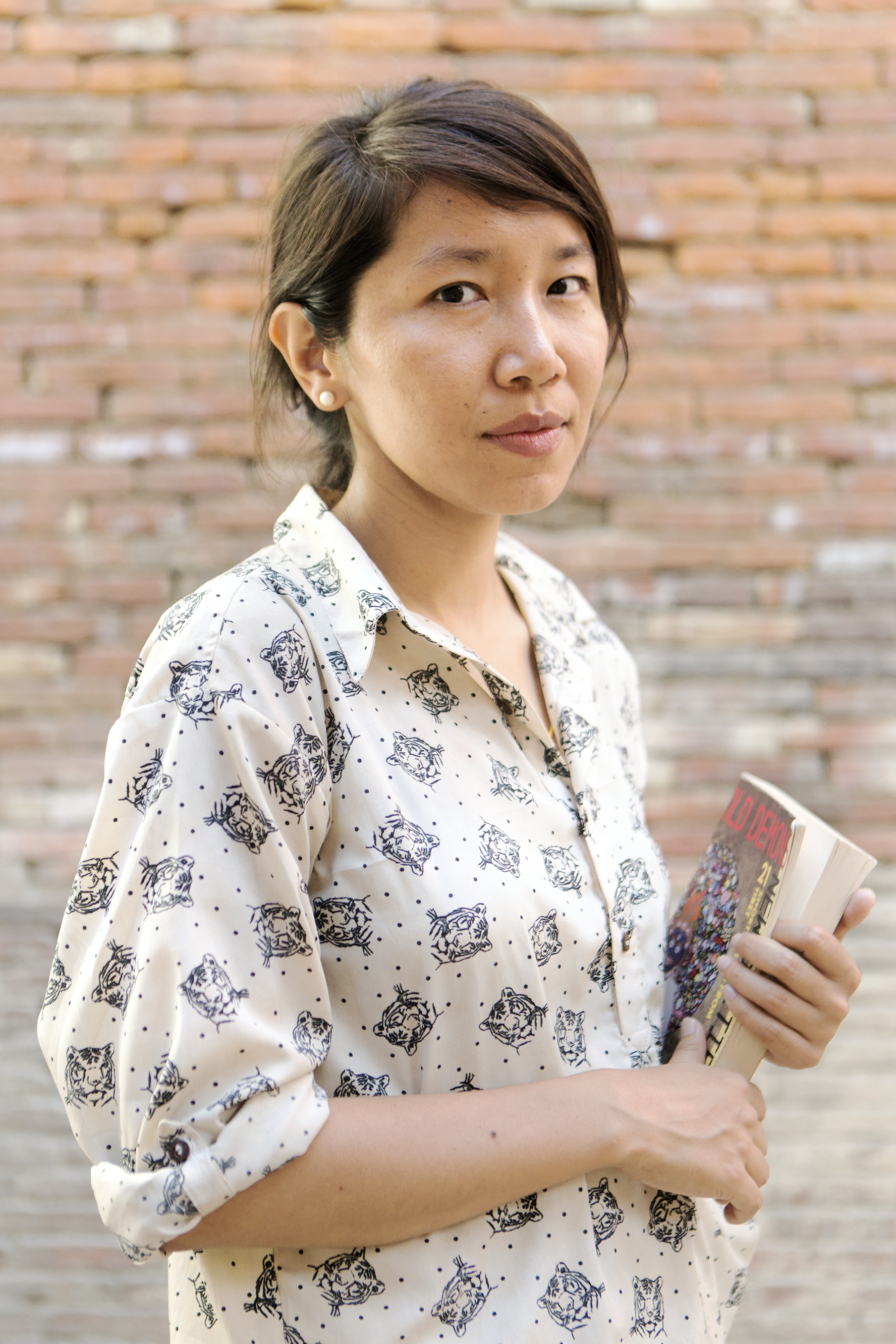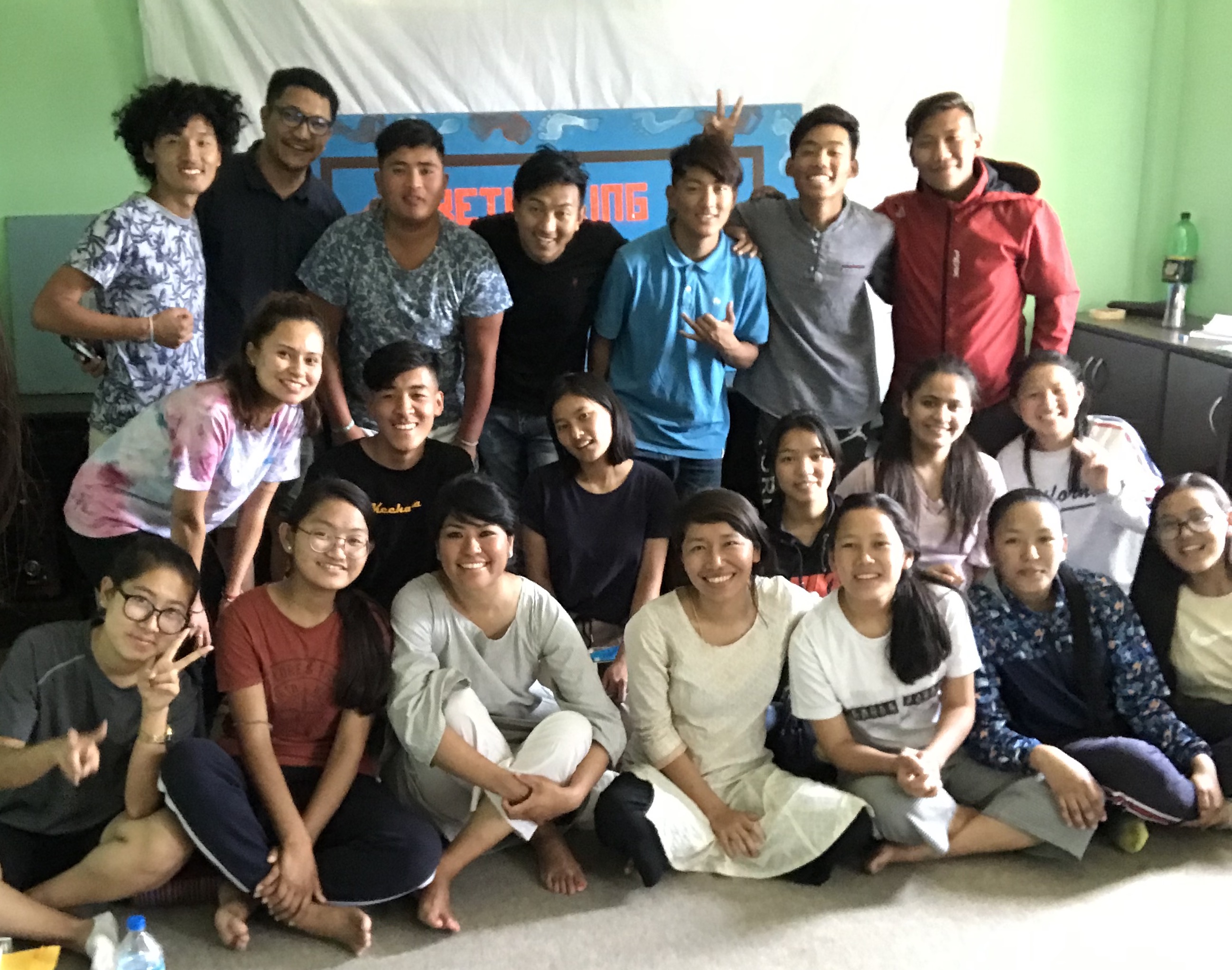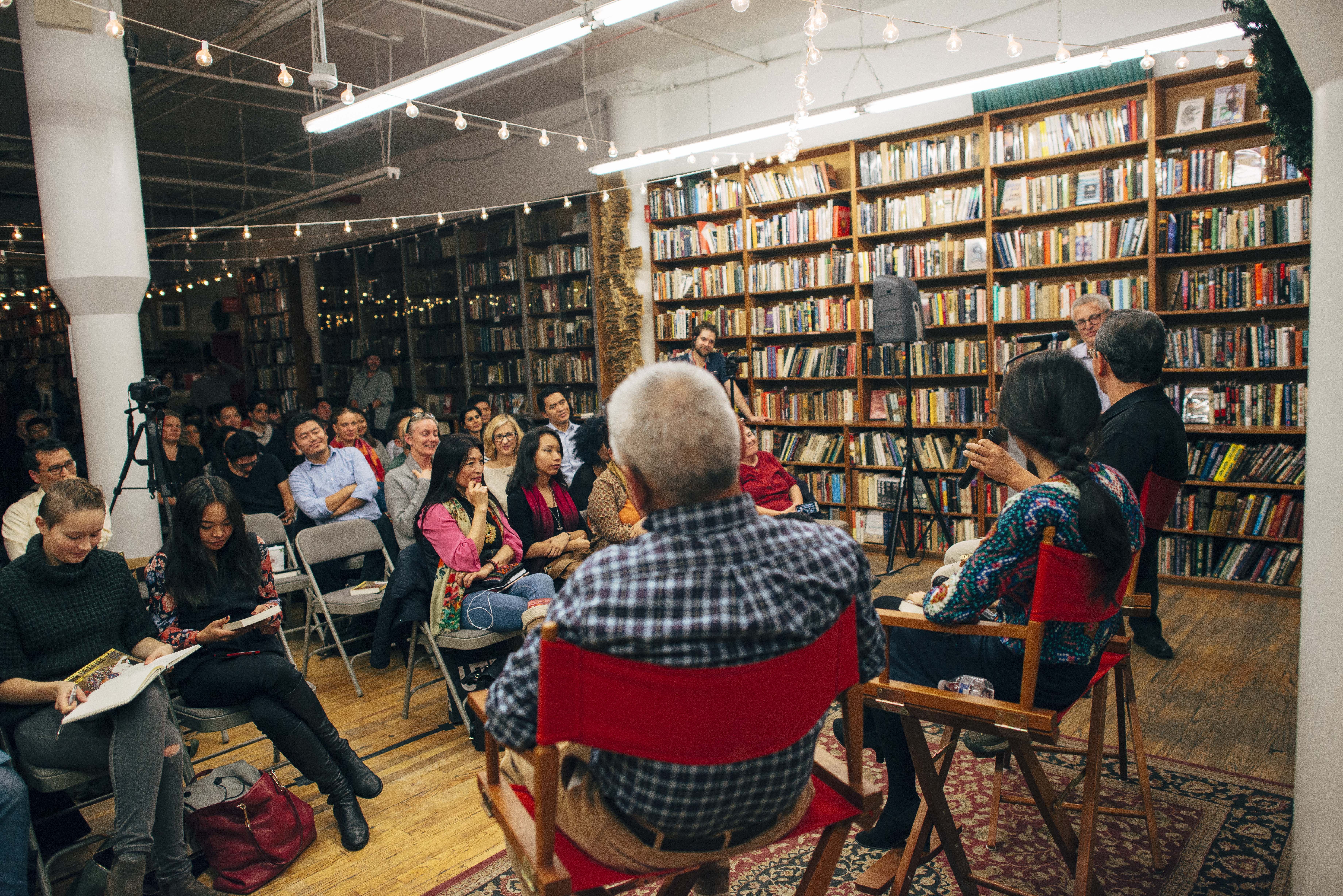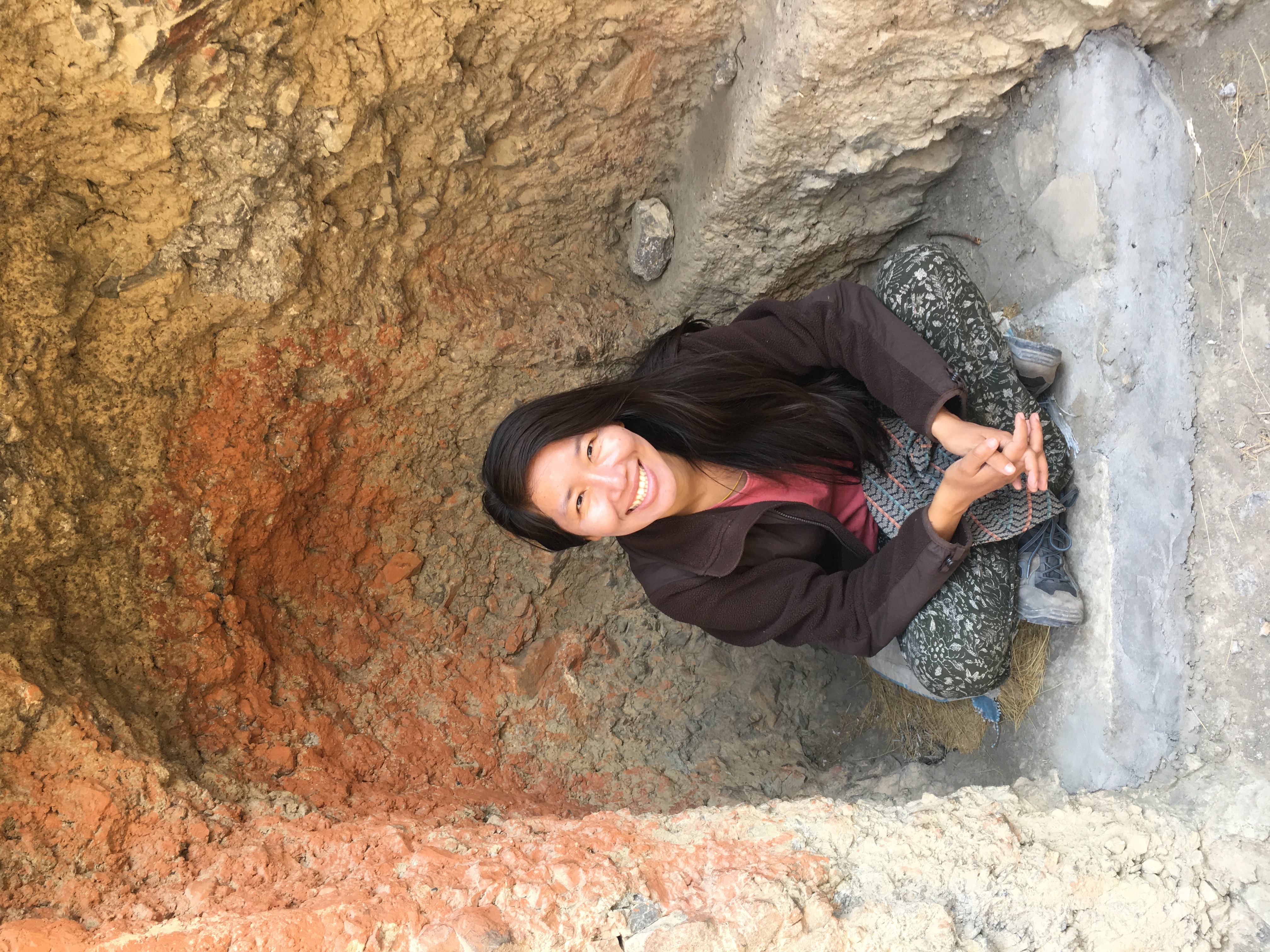
Writing journeys
7 MIN READ

This week on Writing Journeys, writer and editor Tenzin Dickie discusses writerly doubt and frustration, and drawing strength from good writing.

In this week’s Writing Journey, Tenzin Dickie takes us from Tibet to India, Nepal, and the US. Along the way, she shares thoughts on a broad array of topics: doubt, guilt, a sustainable writing life, the glamor of 1990s Kathmandu, comic books, psychic infrastructure, editing, plumbing, generosity, wrestling with confusion, grace, how we idealize writing, and, not least, displacement and possibility. She writes, she says, “to make sense of the world.”
Dickie discusses writerly doubt and frustration. And strength. When presented with the opportunity to edit a collected volume of short stories, at first she was nervous. But she mustered hidden resolve and dived in: “We are always doing something for the first time, aren’t we? That’s just life. I thought, why not?” Next time I face unfamiliar terrain, something I’m unsure of, I’m going to remember this brave attitude. Why not, indeed!
She also offers an excellent piece of advice to aspiring writers: learn to edit other people’s work. “Fixing someone else's plumbing can help you see better how to fix your own,” she writes. I love this, and not just for the excellent metaphor. Whenever I teach, no matter the subject, I always create opportunities for students to read each other’s drafts and learn how to give and receive feedback, not an easy task at first. Inevitably, in the debrief after the first round, one of the more reflective of the group always points out, “You know, it’s interesting, as I read my friend’s essay, my own sentences kept popping to mind. I started seeing my own writing with a new clarity.” That’s so helpful.
Nonfiction comes in many shapes and sizes. Dickie is now working on a family memoir, a “deeply personal history of Tibetan exile.” It sounds amazing, and amazingly challenging. As a historian, I write about the past all the time, but always about people I have little personal connection to. Writing about one’s own family might be easier in some ways, but infinitely more complicated in others. I can’t imagine the many tough decisions. Best of luck, Dickie! May you reach many moments of grace.
Tenzin Dickie is a writer and a translator. She is editor of Old Demons, New Deities: 21 Short Stories from Tibet and has received an American Literary Translators' Association fellowship and a Fulbright fellowship for her literary work. She holds an MFA and a BA from Columbia and Harvard universities. She formerly worked at the Office of Tibet and The Treasury of Lives, a biographical encyclopedia of Tibet, Inner Asia and the Himalayan Region. She currently works at the Buddhist Digital Resource Center and lives in Boston, Massachusetts.
***

Am I a writer? Or, why am I a writer?
For a long time, even when other people called me a writer, I couldn’t. I couldn’t even say, I am writing. I said, I am trying to write.
For most of my twenties, the only way I could write anything was to feel guilty enough, when I had put off writing for long enough that finally a pent up profusion of guilt and energy tore through me, propelling me to finally push out a poem, an article, an essay. The relief I felt then was physical and metaphysical.
On a road trip to Ladakh once, my friend Anto couldn’t take a dump for six days. He came back from open-air bathroom breaks, his sunny face glum and puffier day by day. Finally on the seventh day, the stars aligned and he was able to push out a stool. That relief he felt, that was the relief I felt.
That is not a prescription for a sustainable writing life. I try not to write like that anymore. I try to write from rest and not restlessness. I strive towards a more adult and sustainable writing practice. Because it’s not a sprint, it’s a marathon. One I’ll run my whole life if I am lucky. Which is to say, I am working on systems of writing, rituals, habits. I carve out writing time on the weekends and weeknights. I spend my Saturdays in the library. On so many weeknights per week, I gather the scattered crumbs of willpower sapped by my (enjoyable but tiring, and necessary) day job and open my laptop to write. Often I write in italics, which feels friendlier with its slanting suggestion of script.

Sometimes I think, why the hell am I doing this to myself?
I do know why. Writing is how I make sense of the world. Writing is how I make sense of my world. Reading too.
I started reading as a child in Kathmandu in the 1990s, because I couldn’t understand anything around me. When I was eight and nine, my brother and I spent our two-month winter holidays with my aunt and her family in Kathmandu. Coming from our Tibetan refugee community in the Indian Himalayan foothills, Kathmandu was like Xanadu to me. I was from a small hill station that didn’t even have a proper bus stop and Kathmandu was the most glamorous city in the teeming subcontinent. Back then, Kathmandu left even Delhi in the dust. In Kathmandu, not only was there a mall, inside the mall was an escalator, the height of technological magic.
It was the winter of my displacement. I didn’t speak any Nepali or English. Unable to talk to my older cousins, I instead leafed through the hundreds of comics on their bookshelves. There were Tintin, Asterix and Obelix, Archie, and the Indian Tinkle comics. I pored through them and somehow between one winter and the next, I made the seamless transition from looking at the pictures to reading the speech bubbles.
When I made the transition from reading to writing a decade later, that was seamless too, like breathing out after breathing in. I wasn’t just a consumer anymore, I was a producer. My relationship with literature was forever changed.
But how did it actually happen? I read Tenzin Tsundue’s poem When It Rains in Dharamsala. I read Tsering Wangmo Dhompa’s first poetry book Rules of the House. And I felt...charged. Tibetan Buddhists go to lamas to receive a teaching, a transmission, an empowerment. And that empowers you, strengthens you, it shores up your psychic infrastructure. When I read Tsundue and Dhompa’s poetry, it was like receiving an empowerment. I felt strengthened, charged with possibility — I felt empowered. I wrote a poem.

At first, I was nervous editing the collection that became Old Demons, New Deities: 21 Short Stories from Tibet. I had never edited a book before. But I thought, we are always doing something for the first time, aren’t we? That’s just life. I thought, why not?
And in the doing of it, I learned how to edit other people's work. Editing requires reading like a writer and writing like a reader. It requires fore-knowledge, peering at the draft and envisioning the finished work it could be, and it requires self-knowledge. Without openness, sincerity, and humility, any editing enterprise is doomed. Ego has no place here. You should either edit to improve, or get out of the way. Editing is a service job, as is writing.
Emerging writers should learn to edit because fixing someone else's plumbing can help you see better how to fix your own. Incidentally, editing will also teach you to be a better person, not just a better writer. After all, great editing is an act of supreme generosity — a perfection of generosity.
The work that’s kicking my ass right now is a family memoir in essays. It’s a collection of essays about my family’s journey from Tibet to exile in Nepal and India to the diaspora, from the Himalayan foothills to the American Northeast. It’s a deeply personal history of Tibetan exile. I actually have figured out the trick to writing it. My laptop died and I lost all three drafts of one of the first essays in that book. So I had to rewrite the fourth draft completely from scratch, well from memory. And the draft that followed that rewrite, the fifth draft, I wasn’t just happy with that draft, I was proud of it. In between the first and fifth drafts, something was metabolized, catalyzed. So I now know that I need to write every chapter in this book-to-be five times. Does knowing this help me finish it? No, because now I quail before beginning another chapter.

Writing is such an idealized form of expression. Because my taste is finer than my abilities, I am always catching up to myself. But every once in a while, when I have wrestled with some confusion long enough, I am able to break the skin of my confinement and reach a moment of grace.
They say you are better than the worst thing you have ever done, right? I think you are better than the best thing you have ever written. When I am writing, I can be better than myself.
Writing is a world of power, of possibility. I started reading, and I started writing, because I was displaced. Displaced in Nepal, displaced in America, displaced in exile. Writing places me. Or rather, it helps me place myself. I write, therefore I am.

Tom Robertson Tom Robertson, PhD, is an environmental historian who writes about Kathmandu and Nepali history. His Nepali-language video series on writing, 'Mitho Lekhai', is available on Youtube. His most recent article, 'No smoke without fire in Kathmandu’, appeared on March 5 in Nepali Times.


Writing journeys
8 min read
In this edition of Writing Journeys, novelist and translator Manjushree Thapa illustrates her difficulty in getting from draft to draft and her complicated relationship with writing.
Writing journeys
8 min read
Kathmandu University professor Laxman Gnawali relates a particular instance from his own writing journey that taught him how to better teach writing to young students.
Writing journeys
11 min read
Writer and reviewer Richa Bhattarai fondly reflects on the reading and writing habits instilled by her father in this week's Writing Journeys.
Writing journeys
9 min read
Akhilesh Upadhyay details all he has learned in his 30 years of journalism and offers advice to both aspiring journalists and experienced ones who are stagnating.
Perspectives
21 min read
Binod Bikram KC’s poems offer a sobering perspective on the times we live in
Writing journeys
9 min read
Academics and researchers offer sage advice on how to construct an engaging PowerPoint presentation.
Books
4 min read
In her autobiography, Hisila Yami provides a complex narrative that blends her personal narratives with contemporary political happenings.
Writing journeys
13 min read
In this week’s Writing Journeys, Subhash Nepali describes how the Nepali education system failed him and how writing helped rectify that.